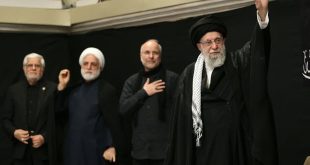Leader of the Islamic Revolution Ayatollah Seyed Ali Khamenei in a proclamation sent to heads of Iran’s three branches of power outlined general policies on family, known as the cornerstone of the Islamic society.
“As the underlying entity and cornerstone of the Islamic society, family is the locus of growth, human sublimity, and the source of well-being, flourishing, prowess, and spiritual promotion for the country and the establishment…” the Leader stated.
In its push toward what the Leader termed a “family-based society,” the country should focus on the ensuing guidelines:
1. Establishing a family-based society and reinforcing and strengthening family and its main functions on the basis of an Islamic model of family.
2. Considering family as a pivotal entity in regulations and laws, executive policies, and all educational, cultural, social, and economic systems, particularly the housing and urban development.
3. Highlighting the functions of family-mosque links to preserve and promote the Islamic and national identity as well as family and society.
4. Forming a nationwide movement to facilitate and disseminate successful marriage for girls and boys and all of those at marriage age through enforcing supportive policies and culture-making.
5. Strengthening family and promoting its social capital on the basis of fairness, satisfaction, friendship, and respect.
6. Offering and working out the Islamic model of family and boosting the Islamic-Iranian life style.
7. Revising, rectifying, and completing the judicial system and the relevant procedures in connection with family.
8. Creating a healthy environment and observing Islamic norms in relations between men and women.
9. Promoting living and economic conditions of families through empowering them to diminish future concerns about employment, marriage, and housing.
10. Organizing the counseling system of the country for offering services before and after forming a family and facilitating access to the services.
11. Strengthening and encouraging families to help the country to push forward with its goals and plans in all cultural, economic, political, and defensive sectors.
12. Supporting the dignity of connubiality, motherhood, house holding, paternal and economic roles of men, etc.
13. Preventing social abnormalities and factors which loosen the foundations of family, particularly the issue of divorce.
14. Supporting female-headed single parents financially, economically, and culturally and encouraging them to re-marry.
15. Adopting supportive and encouraging mechanisms for honoring the old in families and boosting their physical and emotional cares.
16. Working out mechanisms to promote general well-being of families, particularly the fertility well-being and increasing birth rate in order to have a young, healthy, dynamic, and booming society.
 Ijtihad Network Being Wise and Faithful Muslim in the Contemporary World
Ijtihad Network Being Wise and Faithful Muslim in the Contemporary World
